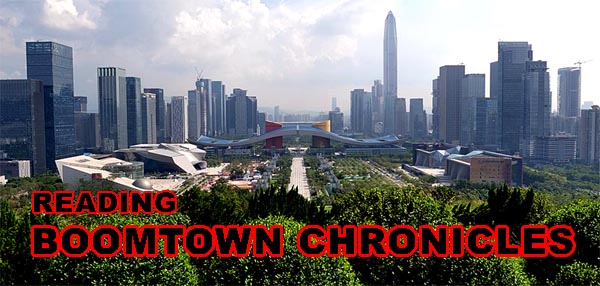 |
| Shenzhen, the Boomtown (Wikipedia) |
Note: Between Lesson #01-128 and #01-208, I wrote 72 lessons explaining expressions in articles published in the Shenzhen Daily. Read more about "Reading Boomtown Chronicles."
Get Ready: What is your demonym? For example, I'm an American, and a Californian, and an Angeleno (from Los Angeles). What are you?
Boomtown Chronicles Part XX - published Monday, November 10, 2008 (cont.)
- In Lesson #01-184 we discussed the word "checkpoints" in the title of Part XX, "Checkpoints gauges of closer cross-border ties." But there are still two interesting words in the title that we haven't discussed.
gauge: measure. (It's pronounced like "gage"). A gauge is a measuring tool, like the gas gauge in a car. "Gauge" may have come from a Frankish word, galgo, meaning a rod or pole for measuring. The same root word also evolved into the English word "gallows," a rod or pole from which a person is hanged in an execution, or from which other things may be hung.
cross-border ties: connections on either side of a border. "Ties" here means "connections," as in "family ties," coming from the verb "to tie" or connect together. While we often find this phrase in relation to Hong Kong, we see "cross-strait ties" in reference to Taiwan.
- The moment in 1997 when Hong Kong was returned to Chinese control "left an indelible memory on every mainlander and Hong Konger."
indelible: unable to be deleted. We often see it in reference to "indelible ink," which can't be erased. So here, the word means unforgettable: unable to be erased from memory.
mainlander: a person living on any mainland, but here in mainland China.
Hong Konger: person from Hong Kong.
For some place endings, there are established models: if the place ends in -ia or -a add -n, so "Californian, Italian, American, Venezuelan. (But sometimes the rules don't hold, as in "Canadian," which ends in -a but gets -ian.)
Other times, there's sort of a regional trend: for some East Asian countries, add -ese: Chinese, Japanese, Vietnamese.
These models are weak, but the resulting forms are well-established.
Cities all follow their own rules: Rome, Roman; London, Londoner; Los Angeles, Angeleno. What to do with our "twin cities"? Some, indeed, give "Hong Konger" as the proper term. Others give Hongkonger (a mere spelling difference), or Hongkongese (following the "East Asia" model). All are possible.
I can find no standard demonym (noun describe a group of people) for people from Shenzhen, but the often-heard "Shenzhener" seems to me an excellent choice.
--------
Read more: https://en.wikipedia.org/wiki/Shenzhen
Practice: Choose the correct term to fill in the blank in the sentence below:
- cross-border ties
- gauge
- indelible
- Italian
- Japanese
- mainlander
- Shenzhener
- When I lived in Tokyo, I bought a lot of ________ souvenirs.
- The mark wouldn't come out of his shirt, because he stuck a pen with________ ink in his pocket.
- I met a guy living in Hawaii who used to be a ________.
- It's hard to ________ people's reactions without seeing their faces.
- I lived across the border from Hong Kong for eleven years, but never really became a ________.
- I love pasta, pizza, and other ________ foods.
- Many of my students in Shenzhen had ________ with family in Hong Kong.
Answers are in the first comment below.
Submitted to the Shenzhen Daily for November 18, 2008


Answers to the Practice: 1. g; 2. d; 3. b; 4. f; 5. a; 6. c; 7. e
ReplyDelete